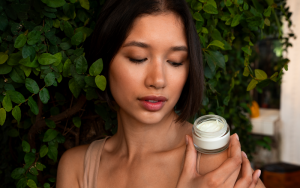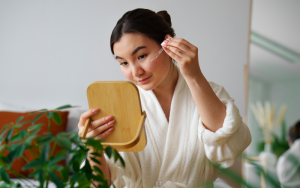Understanding Your Skin Type: How to Choose the Right Skincare Routine
When it comes to skincare, understanding your skin type is the foundation for achieving a healthy, radiant complexion. Every individual’s skin is unique, and using the wrong products can lead to irritation, breakouts, or dryness. In this guide, we’ll explore the different skin types, their characteristics, and how to choose the right skincare routine for each.
The Four Main Skin Types
- Normal Skin
- Characteristics: Normal skin is well-balanced, with neither excessive oiliness nor dryness. It typically has a smooth texture, few blemishes, and minimal sensitivity.
- Skincare Routine:
- Cleanser: A gentle foaming or cream cleanser that removes impurities without stripping moisture.
- Toner: Optional, but if used, choose a hydrating toner to maintain balance.
- Moisturizer: A lightweight lotion or cream that provides hydration without clogging pores.
- Sunscreen: A broad-spectrum SPF 30 or higher to protect against UV damage.
- Oily Skin
- Characteristics: Oily skin is characterized by excess sebum production, which can lead to a shiny appearance, enlarged pores, and a propensity for acne and blackheads.
- Skincare Routine:
- Cleanser: A foaming or gel cleanser with salicylic acid or tea tree oil to control oil and prevent breakouts.
- Toner: An astringent toner with witch hazel or alcohol-free formulas to remove excess oil.
- Moisturizer: A lightweight, oil-free gel or lotion that hydrates without adding extra oil.
- Sunscreen: A non-comedogenic sunscreen formulated for oily skin types.
- Dry Skin
- Characteristics: Dry skin often feels tight, rough, and flaky due to a lack of moisture. It may be more prone to fine lines and irritation.
- Skincare Routine:
- Cleanser: A creamy, hydrating cleanser that doesn’t strip natural oils.
- Toner: A hydrating toner with ingredients like glycerin or aloe vera to replenish moisture.
- Moisturizer: A rich cream or balm that provides deep hydration and locks in moisture.
- Sunscreen: A moisturizing sunscreen with SPF to protect without drying out the skin.
- Combination Skin
- Characteristics: Combination skin features both oily and dry areas, typically oily in the T-zone (forehead, nose, chin) and dry on the cheeks.
- Skincare Routine:
- Cleanser: A gentle cleanser that balances both oily and dry areas.
- Toner: A toner that hydrates without overwhelming the oily parts of the skin.
- Moisturizer: A lightweight moisturizer that hydrates the dry areas while controlling oil in the T-zone.
- Sunscreen: A broad-spectrum SPF suitable for all skin types, ensuring balanced protection.
Tips for Identifying Your Skin Type
- Observation: Cleanse your face and wait for an hour without applying any products. Observe how your skin feels—tightness may indicate dryness, while shine suggests oiliness.
- Blotting Test: After a few hours, use a blotting paper on different areas of your face. If the paper picks up oil from the T-zone but remains dry elsewhere, you likely have combination skin.
- Seasonal Changes: Note how your skin reacts to different seasons. Some people may experience oiliness in summer and dryness in winter, which can affect their skin type classification.
Adjusting Your Routine
Once you understand your skin type, it’s essential to adjust your skincare routine accordingly. Start with a basic regimen tailored to your skin’s needs, and consider incorporating additional treatments as necessary:
- Exfoliation: For oily and dry skin types, exfoliation can help remove dead skin cells and improve texture. Use chemical exfoliants (like AHAs or BHAs) or gentle scrubs once or twice a week.
- Masks: Incorporate masks that address your specific concerns—hydrating masks for dry skin, clay masks for oily skin, or soothing masks for sensitive skin.
- Serums: Serums can target specific issues, such as hydration, pigmentation, or anti-aging. Choose serums that align with your skin type and concerns.
Conclusion
Understanding your skin type is crucial for selecting the right skincare routine. By recognizing the unique characteristics of your skin and choosing products that cater to those needs, you can create a personalized regimen that promotes a healthy, glowing complexion. Remember, skincare is a journey—be patient, and don’t hesitate to adjust your routine as your skin changes over time!




Add comment